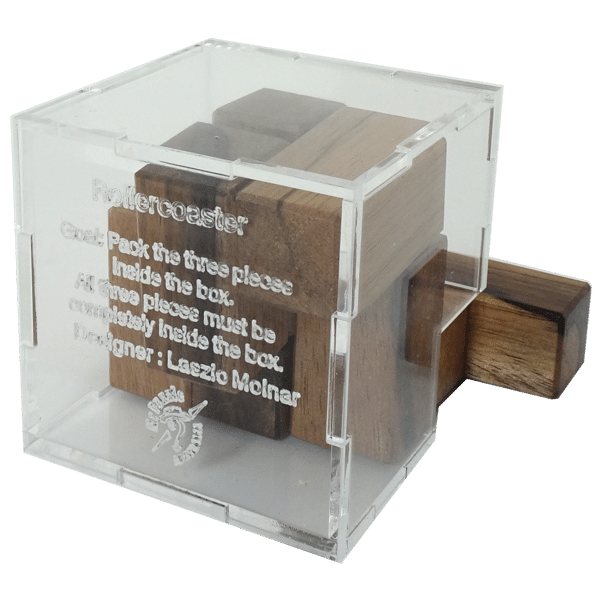The Opening Bat sequential discovery Cricket Bat Puzzle
4 December 2010Sold out 2010 Limited Edition Set of 50. Original Price: AU$800.00 (AU$727.27 ex Australian Taxes) These puzzles have resold at Auction. Recent results: Puzzle Paradise…


There is only three piece to fit in the box and yet the Rollercoaster is an interlocking puzzle, a dexterity puzzle and a packing puzzle all rolled into one. And it’s hard!
According to the designer the uniqueness of the puzzle is that it’s meant to be a put-together puzzle AND a dexterity puzzle in one. The puzzler should carefully move the box and pieces, always holding them in the right direction, but without touching the pieces inside the box.
Laszlo called the puzzle Rollercoaster after the action of rolling the pieces around inside the cube to get to the solution. He says “I like amusement park analogy, and here the movement of all pieces reminded me of the rollercoaster.” Laszlo is from Malta and though there isn’t a huge puzzle community there he says his puzzle design days really started as a challenge to design something to stump a puzzle friend but he’s since found he enjoys the process very much.
The puzzle was an entrant in the 2018 Nob Yoshigahara Puzzle Design Competition.
The feedback on the puzzling experience on this one has been great. Well known puzzlers have taken longer than expected to solve and commented how much they enjoyed the puzzle. This comment from Dic Sonneveld:
“It is attractive to see and the goal is clear and challenging. It appears to be unexpectedly difficult, despite the fact there are only three pieces to bring into the box and these pieces are quite simple (even the “key piece” is relatively simple because it is a “string” of cubes). And it can be solved without using a computer. (It took a puzzle solver friend 2 hours but I needed almost a day, but solving it by hand (manipulating outside the box) and with pencil and paper is much more challenging and satisfying).
It has amazed me very much that after the two small pieces has been brought “into position”, you still need 12 linear moves to get the key piece in its place. It is like a 3D sliding piece puzzle. I never thought such complexity could be possible in a 3x3x3 space.”
High praise indeed from a renowned puzzle solver and inventor.
The puzzle has 4 pieces if you consider the clear acrylic box as one of the pieces. It has one corner cut out and this allows you to insert the wooden pieces into the cube. The wooden pieces are made from Papua New Guinean ebony hardwood. The wood is a salmon pink in colour with dark brown to black streaks on some of the pieces. It is not the black ebony from Africa. It varies greatly from piece to piece so the picture is indicative of what puzzles generally look like.
Size: 67mm x 67mm x 67mm A step by step printed solution is included.